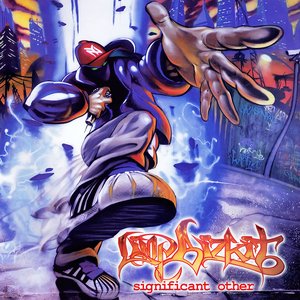Published on Apr 10, 2006
There’s a reason I consider myself part of Generation
X, although I was born in 1983. Well, there are several, actually,
but the main one is that I’m embarrassed about my generation’s
music.
Limp Bizkit was huge when I was in high school, and
although the rock critics and anyone over the age of 19 dismissed
them, my fellow students and I had to deal with Limp, Korn, Kid
Rock and P.O.D. on the radio every day. The more I got into the
beginning alternative boom — Pearl Jam, R.E.M., Nirvana, and even
early Metallica — the sadder I became that this is what my
generation had to offer.
One listen to Significant Other reveals its
age. This is definitely late 90s rock here — loud power chords,
lack of solos, misguided lyrical anger, hip-hop influences and
plenty of rapping. But where P.O.D. has some spiritual backing and
Kid Rock only wants to have a good time, “singer” Fred Durst wants
to just rail against women, society and those who dismiss him with
a frat-boy’s sense of entitlement. I hate him for it.
In fact, Durst is one of the most despised frontmen
in all rock, as well he should be. His stupid smug grin, his payola
incident, his inciting of riots at Woodstock ’99 and the classy way
he talked about Britney Spears’ pubic grooming habits on Howard
Stern reveal what a classy guy he is not. But more than that, he
has no trace of irony about him. He thinks everything he sings/raps
is gold, that he connects to millions, and that his style of music
and aggression makes him cooler than anyone.
To its credit, Significant Other is redeemed
by the other four band members, but not enough to warrant an
hour-long listen. The sophomore release is the only time the band
made any sort of artistic statement, varying slightly from their
power-chord rap-metal attack that has been done to death.
What Durst fails to realize — besides how much of a
tool he is — is that Rage, Korn and Kid Rock do the
anger-rap-metal better than anyone. When Rage rails against
society, it means something. When Durst says “We’ve all been
treated like shit” on the insipid “Break Stuff,” it sounds like a
white frat boy bitching about his equally shallow girlfriend
dumping him for a guy with a bigger truck. So, of course, Durst
liberally swears throughout the album, just to prove he’s upset.
What a loser.
Now, there’s a reason Limp was popular in their day,
and that’s Wes Borland, a guitarist who deserves much more than he
got with this band. He and the rhythm section rein in the power
long enough to make “Rearranged” a good song, not quite a moving
ballad but far more potent than anything else here. “Nookie” is
still a guilty pleasure, driven by a hyper bass and a menacing
undercurrent that is (surprise!) ruined by the lyrics, which any
kid knows are “I did it all for the nookie / The nookie / So you
can take that cookie / And stick it up your yeah.”
While the rest of the record is lost in a rap-metal
sludge set to whiny “I-hate-life” vocals, a couple highlights save
it from total banality (which the band would wallow in for the rest
of their career). “Nobody Like You” is nearly a Korn song — not
coincidentally, Jonathan Davis and Scott Weiland stop by for
background vocals, and it’s a forgotten minor classic. And “A
Lesson Learned” is stark in its simplicity, but Durst’s
electronically-altered a cappella gets old after a while.
What saves this from a lower grade is its timeless
theme of the pain felt after a breakup. Nearly all the songs
feature Durst expressing anger, guilt or pain at the girl who left
him during the making of this album, and that anger occasionally
comes out in fiery bursts of creativity. This is where the artistic
merit comment from earlier comes in — future LB discs deal with
anger at the “media dykes,” Britney and the world in general, but
this one is the only time where the band came close to being
relevant.
But three or four good songs don’t cut it. As the
band says in the the intro and outro, “You wanted the worst, you
got the worst. The one, the only, Limp Bizkit.” The outro hidden
track also goes into depth about how great the band is and then the
money wasted on the CD — and in this case, that’s fairly
accurate.
Another note to artists: Don’t name a song after a
year (“9 Teen 90 Nine”). It horribly dates your music. Although in
this case, anyone who listens to this disc could predict that Limp
was a passing fad, and when the band’s 15-year-old fans grew up
they could move on to real music. I grieve for those who wasted
time with this band — and I’m glad to point out that Durst has
finally become a laughingstock.
To close, I’ll say this to Fred Durst. Give it up,
dude. Nobody likes you anymore. We can see through you and you have
nothing to offer. Your anger is fake, your smug grin is annoying,
and your payola incident to get your shit played on the radio is
the only way you would have ever reached an audience. You had three
good moments on Significant Other — now go home, put the
quadruple-platinum award for this disc on your wall and retire.
